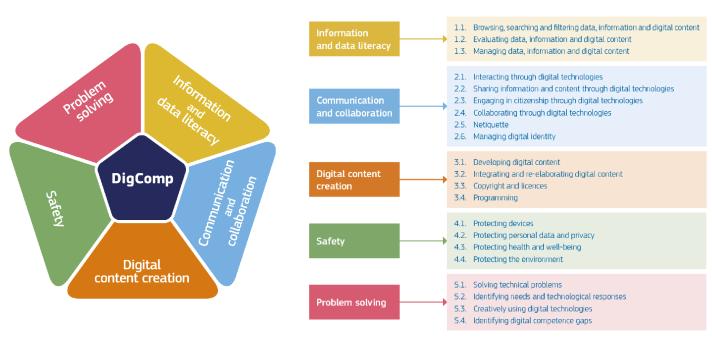In DigComp, digital competence is defined as:
"…the confident, critical and responsible use of, and engagement with, digital technologies for learning, at work, and for participation in society. It is defined as a combination of knowledge, skills and attitudes.”
(Council Recommendation on Key Competences for Life- long Learning, 2018).
DigComp, the Digital Competence Framework for Citizens, identifies the key components of digital competence in five areas and 21 specific competences. It also describes eight proficiency levels, examples of knowledge, skills and attitudes, and use cases in education and employment contexts.
See the DigComp Framework document for the description of the 21 competences and this infographic to read about the key features of the eight proficiency levels.
What is DigComp?
The DigComp project, implemented by the Joint Research Centre on behalf of the European Commission, started in 2010. Since then, awareness among Member States of DigComp as the EU-wide framework for framing digital skills policy, developing, and measuring digital competence, has consistently increased.
The DigComp framework remains crucial to the EU's objectives in enhancing digital skills. It supports the EU's Digital Education Action Plan 2021-2027, which in turn contributes to the Commission’s priority ‘A Europe fit for the Digital Age’ and to Next Generation EU.
It serves multiple purposes, including designing competence assessment tools, creating training courses and materials, and identifying professional digital profiles within the realms of employment, education and training, and social inclusion (see DigComp Implementation Guides for concrete examples).
Being digitally competent: A task for the 21st-century citizen
DigComp is updated to reflect the evolving nature of digital competence. The latest version, DigComp 2.2 (2022), is the fourth iteration:
- It provides more than 250 new examples of knowledge, skills and attitudes that help citizens engage confidently, critically and safely with digital technologies, and new and emerging ones such as systems driven by artificial intelligence (AI).
- On the second part of the publication, it gives a snapshot of the existing reference material for DigComp, consolidating previously released publications and references.
- The annexes include a specific appendix on Citizens interacting with AI systems and on Remote/Hybrid work. Annex 4, in particular, follows digital accessibility guidelines.
See DigComp Governance for a brief description of the previous framework versions and links to the reports.
Join DigComp-related Communities of Practice (CoPs)
There are two CoPs to support implementation of DigComp in Member States: the DigComp CoP and the Digital Skills Certification CoP.
Both of these are hosted by All Digital, a pan-European association that offers different interest points on DigComp: from policy, research, education and training to employability and human resources development, inclusion projects, among others.
DigComp CoP and Digital Skills Certification CoP
The CoPs are free and open to all stakeholders to join.
Information on DigComp 2.2, including a high-level overview and links to other DigComp publications.
The JRC expects to publish an updated version of DigComp in late 2025.
Developed by the JRC to support stakeholders’ implementation of the DigComp framework
Self-assessment tools and how to use the EU-wide Eurostat Digital Skills Indicator (DSI) to monitor levels of digital competence.
Contact email, re-use policy, information on modifications and translations, infographics and communication material.
DigComp governance within a multi-stakeholder model, including the versioning model of DigComp and contact to the team.
In support of Action 9 of the Digital Education Action Plan (2021-2027), the JRC is conducting a feasibility study on an EDSC based on DigComp.



